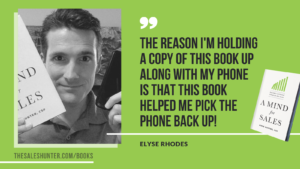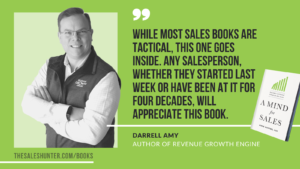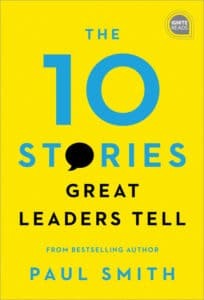Mark Hunter's Blog, page 27
April 7, 2021
Why Setting and Achieving Goals is Hard
I talk about goal setting in A Mind for Sales, and I have just launched a new “A Mind for Sales” masterclass on The Sales Hunter University, too. I want you to hit the link at the end of this blog because I am going to give you an offer to get this limited-time program.
For now, I am going to walk through 10 problems people have that make setting and achieving goals so difficult. These are 10 of the many things I discuss in the program, as well.
Video – Why Setting and Achieving Goals is Hard
1. UnreasonableHere is the problem: Often times, people simply set unreasonable goals or are even given unreasonable goals by their boss. However, your goal is only unreasonable if you fail to put a plan behind it.
If you are not willing to take the time then yes, it is completely unreasonable.
The unreasonable becomes reasonable when you have a plan.
2. No Commitment
The issue may be that you simply do not make a commitment to it.
You set your goals at the beginning of the year or quarter and you do not look at them again until the end of the year. You may think, “I have not achieved my goals up to this point, so I am not even going to worry about it.”
No big deal? No commitment.
If there is no commitment, it is no wonder you are not achieving your goals! Once again, it comes back to having a plan.

3. Failure to Believe
Do not catch yourself thinking, “That goal is so far out there, I just cannot believe I can achieve it.”
Look at the mark of a champion, or various professional athletes – they do not go into any kind of contest without expecting to win. They simply do not have failure in their DNA.
It comes down to the fact they simply believe they can achieve what they set out to do.
If you do not believe in it, why would you ever achieve it? Put a plan behind it and visualize.
4. Review and Plan
You need to review and plan regularly. Something I have found and talk about in my book, A Mind for Sales, is that goal-driven, top performing individuals review their goals weekly, even daily.
They are continuously assessing what they have to do each and every day. They are continuously reviving the plan.
Goal-driven people focus their time on achieving their goals. If a certain use of their time is not achieving their goals, they do not want to do it.
5. Time Concerns
Top performing people always know and understand how much time they have and how they will use it. It does not mean they are caught up thinking, “I have so much extra time on my hands.” No, they know when they have to put the pedal to the metal and make it happen when they are behind.
They understand time and they value it. They also do not allow time to get away from them.
Why? They literally block their calendar. I do this with my own calendar; I block out every hour of the day with each activity I have planned.
These activities have to be one of two things: Revenue producing or helping me achieve my goals.
Be focused and be time concerned.

via GIPHY6. Lack of a Role Model
If you have never been around successful people, it is very difficult for you to be successful.
Have you ever noticed how certain sports teams just happen to do exceptionally well? It is usually because they have a role model on the team who drives them to a higher level of success.
Who is your role model? Who is the role model you look up to that you mimic, copy and aspire to be?
7. Accountability
Who are you accountable to in your goals?
In A Mind for Sales, I discuss in detail the importance of having a mastermind group. I personally have a mastermind group that I talk about frequently.
This group consists of three other individuals and we all hold each other accountable to everything we do. It allows me to know that somebody is watching me, and I am watching them.
What does this do? When I am falling down, they help pick me up and vice versa. Collectively, we help each other out.
You have to have accountability and it has to go beyond your boss. Do not think to yourself, “Well, I am accountable to my boss so that is enough.” No, you need a peer that you can be accountable to, as well.
8. Poor Focus
The problem is you simply are not focused on your goal. Earlier, I made the comment that everything you do needs to be focused on activities that are either revenue producing or helping you achieve your goals.
Poor focus is when you are just busy, not productive.
You might be busy doing a lot of ‘stuff,’ but it is not driving you towards your goals. You have to be mindful of clearing out all the ‘stuff.’

via GIPHY9. Small Steps
You do not just wake up one morning and boom – you’re incredibly successful. It is all in the small steps.
It is like joining a gym to lose weight and get in shape. You might go six or seven times and think, “Well, I am just not in shape and losing weight yet, so I am just done going.” You have to go every day on a regular schedule for months and then, those small steps become big successes.
You achieve your goals through small steps, one at a time.
Feeling all over the place? Get focused here.
10. Attitude
Your attitude is going to drive more than anything else when it comes to your ability to be successful.
Give me somebody with a great attitude and they will find a way to get it done.
When you have the right attitude, you have the right motivation.
When you have the right motivation, you have the right energy level.
When you have the right energy level, it is amazing what you can get done.
Now, I want you to check out my online program that is usually only offered to Level 3 TSHU students. This “A Mind for Sales” masterclass is available to the public now through April 15th, and will help you move from mediocre to masterful. Check out all the details here. It’s there for you because I want you to be successful.
https://thesaleshunter.com/wp-content/uploads/2021/02/Are-You-Ready-Rev3.mp4
I sure hope you have subscribed to my blog and channel, so you never miss a post and video like this every week. Keep learning with my books, A Mind for Sales and High-Profit Prospecting, too.
Great selling!
Copyright 2021, Mark Hunter “The Sales Hunter” Sales Motivation Blog. Mark Hunter is the author of A Mind for Sales and High-Profit Prospecting: Powerful Strategies to Find the Best Leads and Drive Breakthrough Sales Results.
FollowFollowFollowFollowFollowFollowThe post Why Setting and Achieving Goals is Hard first appeared on The Sales Hunter.
April 2, 2021
Resources and Reserves in Our Life
Do you want to get up on the deicing truck to deice the plane so it can take off safely?
Think about that for a moment. That is a job I would not want to have. In fact, I look around out there behind me and I can see other vehicles, too. There are some luggage carts, power trucks, power tugs, et cetera. I think about how all of those vehicles required to put a plane in the air.
In this Mornings with Mark, I’m talking about all of the other things that we need to keep ourselves going. What are we doing to keep resources around us?
I am recording this in February as we are in the middle of a deep freeze and hearing stories of power being cut to millions of homes across the country. There just are not enough resources or reserves. The state of Texas is going through some major issues right now because of it.
Now, I am not going to get into a situation talking about why that is, but it really comes down to having the tools, reserves and resources to be able to call on. For instance, that deicing truck is needed to enable that airplane to fly.
We have to have reserves. What are the reserves that you have?
Who are the people that you have in your life that you can call on to help you out?
Who are the other activities and other things you can rely on to help you get through situations?
The only way we get through life is when we have resources and reserves to help us. Just as we need resources and reserves, we need to be the resources and resedusrves to other people.
My question for you is: Are you as willing to be a resource for somebody else as they are for you?
Great selling.
Copyright 2021, Mark Hunter “The Sales Hunter” Sales Motivation Blog. Mark Hunter is the author of A Mind for Sales and High-Profit Prospecting: Powerful Strategies to Find the Best Leads and Drive Breakthrough Sales Results.
FollowFollowFollowFollowFollowFollow
The post Resources and Reserves in Our Life first appeared on The Sales Hunter.
March 31, 2021
Why I Released “A Mind for Sales” During a Pandemic
I first want to start by saying thank you. It has been one year since we came out with the book, A Mind for Sales, and what a year it has been.
This book came out on March 31st, 2020. Remember that day? Remember what was happening on March 31st, 2020 and compare it to where we are today.
I want to tell you a little bit about the story behind A Mind for Sales. This book first came alive in 2018. As I came up with the idea, I discussed it with my publisher, we talked about it and the date was set.
Video – Why I Launched “A Mind for Sales” in a Pandemic
We decided then and there we would release it in the spring of 2020. We timed it with a number of events and expected it to come off absolutely terrific. The plan looked good going into the fall of 2019, and really, into the beginning of 2020, too.
Then, as we all know, the pandemic happened. Think about where we were in March. We were being introduced to Dr. Fauci, terms like ‘shelter-in-place’ and more.
We experienced a lack of activities that we never thought would happen. Sure, the Super Bowl carried on, but the NBA shut down. The NHL shut down. The March Madness basketball tournament was canceled. Some of those games were literally canceled at halftime.

via NCAA March Madness on GIPHY
Players walked off the court, offices shut down and we suddenly realized what it meant to spend all day at home.
In the midst of all that, I’m launching a book.
During this period, it was interesting how many phone calls I received from very good friends and peers saying, “Mark, you’re not going to launch the book, are you?” “You’re going to wait, because this pandemic will blow over in a couple of months and you can launch the book in June or July, right?”
In the weeks leading up to the release date, I was being hit with a number of phone calls and no, I was not planning on postponing the launch.
Shortly thereafter, I received word that Amazon is only shipping essential items because of the influx of online shoppers and the stress that was causing on shipping. My book was not deemed essential. Not only would Amazon not be shipping it, but they may not even receive it. Bookstores were closed. All the signs were indicating, “Hold on and wait,” but no.

You see, A Mind for Sales is about having the right mind to sell. “The most difficult sale you will ever make is the one to yourself.” That is the most important sell.
I believed firmly in this book and there was no way I was going to deviate from this because I knew the message had to get out.
We launched the book on March 31st, 2020. Of course, we made a few changes, but we learned a lot along the way, and it made for an even more successful launch. We did things that we never thought were going to be possible because we were committed to making the launch of A Mind for Sales happen.
What has happened since that point? Thousands and thousands of people have read A Mind for Sales, and have had their lives and their selling careers impacted by the message in the book.

None of that would have occurred if I had waited and thought about postponing the launch.
If I had heeded the advice of a number of people and decided to wait to release the book until the pandemic was over, we still would not have launched one year later!
Sales is about being focused. It is about having a plan, believing in yourself and making it happen.
If I had chosen not to launch the book, there is no way I could say that I am following the advice in A Mind for Sales.
I am excited at the impact the book has had. Every day, I get emails and phone calls hearing how it’s helping people. I love it.
I want you to do me a favor – if you have read the book, go out to Amazon and leave a review, would you? Throw out something on social media to let other people know. If you have not read the book, get your copy here.
A Mind for Sales is an impact maker and it is the reason why when the book first came out, people were saying, “How did you write this book so fast and get it out so quickly?”
In reality, it was written several years earlier. A Mind for Sales is the right book for the right time and the right message. I truly believe it is the right message for you right now.

I stand absolutely confident in knowing you have a mind for sales and that I have a mind for sales. That is why I had no hesitation nor doubt the launch was going to happen and did happen on March 31st, 2020.
Let me know how the book has impacted you. You have a mind for sales.
Great selling.
As one of my loyal blog readers, I have an opportunity today for you to invest in your skills. Together, we can take today’s challenges and turn them into once in a lifetime opportunities. Consider this quote that I wrote in my new book, A Mind For Sales and say often:
When challenges arise we don’t rise to the occasion, we sink to the level of our training.
Are you ready? Watch the video above, and come be a part of the continued conversation as we all become masters in our fields and passions. My new program, The Sales Hunter University, is where you’ll find it all – unlimited personal growth, hands-on learning, quick tips, abundant resources, and an amazing community.
For more information and to join, click here!
Copyright 2021, Mark Hunter “The Sales Hunter” Sales Motivation Blog. Mark Hunter is the author of A Mind for Sales and High-Profit Prospecting: Powerful Strategies to Find the Best Leads and Drive Breakthrough Sales Results.
FollowFollowFollowFollowFollowFollowThe post Why I Released “A Mind for Sales” During a Pandemic first appeared on The Sales Hunter.
What Strategies Work When Using the Telephone to Prospect?
What strategies work the best when using the telephone to prospect?
I write in my book, A Mind for Sales, a list of proven strategies when using the telephone to prospect.
Right now, I want to drill down on 10 strategies you can use to make the telephone work for you when prospecting.
Video – What Strategies Work When Using the Telephone to Prospect?
1. Use it!I am amazed at the number of people who do not use the telephone to prospect. They justify it with thinking, “Nobody picks up and answers.”
Nobody picks up if you don’t call.
I realize answering rates might be down, but you know what? I can have one phone call and exchange more information in those two minutes than I will through half a dozen emails. Use it.
2. No Stupid Questions
What qualifies as a stupid question?
“How’s the weather?”“How’s your weekend?”“How’s your day going?”Come on. Do you really think the person on the other end of the phone really cares what you think?
When you get somebody on the phone, you go right to what you are supposed to be talking about. Start instead with, “Hey, I’m calling with regards to this,” or “I wanted to get your opinion on this.”
I love using this magical word: opinion.
If you are going to ask a question, phrase it as, “I’d love to get your opinion on this.” People always want to share their opinions. Stop the stupid questions.
Read more on how powerful questions can strengthen your relationship with the customer here.
3. Use it with Other Methods
Use the telephone along with email, social media and mail.
The telephone is one tool, yet I find too many people use every other tool except for the telephone. It is often overlooked how the telephone and email work effectively together.

via Soul Train on GIPHY
4. Have a Plan
Making a single call and thinking, “They didn’t answer so they must not be interested,” is not a plan. That is just a one-and-done attitude.
You have to plan where you are going with that person and routinely be following up. Remember: It is not ABC (Always Be Closing) but it is ABV (Always Bring Value).
Your plan should look something like this: I have a 15-step cadence, and I am going to call them today, do an email here and then I might call again at this point. I might engage on social media later on.
Have a plan and work the plan.
Do not start what you cannot finish. I see so many salespeople make two or three phone calls, get caught up in other things and then neglect to follow up with the person again. You need to be able to go all the way through.
5. Build Trust and Credibility
The telephone is powerful because it allows you to communicate and connect with the person.
It allows you to understand their emotions and feelings they are sharing with you. It allows you to have instantaneous dialogue and communication.
What does this do? It helps you build trust and credibility, which are both things you can do much faster on the telephone.
No other medium besides the telephone allows you to communicate as rapidly nor as effectively through your voice inflection, tone, pauses and your ability to follow up and ask questions.

6. Use Your Personality
Your personality is a huge asset, so use it. Let your personality come through; you will be much more comfortable and as a result, you will make the other person more comfortable. By doing so, you will have a better conversation.
If you are the crazy aunt or the weird uncle, then we have a problem. That being said, you probably would not be successful in sales anyway, so that is an entirely separate issue.
In short, let your personality come through.

via GIPHY
7. Ask More Questions
When you are comfortable and confident, you are going to ask more questions. This is huge.
Anytime somebody shares with me something, I want to come back and ask a follow-up question on it.
I may have this list of 10 questions I want to get through and I know I will never get through the 10 because I don’t have to. Otherwise, I would be on the phone with the prospect for three days.
When I ask you a question and you share your answer with me, I want to ask you a follow-up question. I am going to keep building and building and building on it.
I love asking people up front, “I would like to get your opinion on this,” and then ask follow-up questions on whatever they share with me.
It is not about what you say, it is about the questions you ask.
8. Voicemail
I get it – you call somebody, and they are not there. You must always leave a voicemail.
Do not ever let yourself think, “I am not going to leave a voicemail because nobody listens to those anyways.” You’re right, but it only takes 15 seconds to leave a voicemail so why wouldn’t you?
I have several videos on my YouTube channel that specifically talk about how to leave a good voicemail.
Keep it short and keep it tight. It may not generate a response, but if they listen to it, they are going to catch your personality and a sense of who you are.
Make it meaningful and leave a voicemail.

via ABC Network on GIPHY
9. Uncover Needs
The phone call is always about uncovering needs. Uncovering needs gets you to the next step, which is the whole point of a prospecting phone call.
You earn the next step by uncovering needs.
My objective is this: I want to learn one piece of information about the prospect. If I can do so, it is amazing how I will now have the meat with which to carry on and go forward.
I just want to learn one thing that allows me to uncover the needs, and I will use that in the next phone call or conversation.
Read how you can get customers to focus on their needs instead of price here.
10. Always Have a CTA
You always need to have a call-to-action and know what your next step is.
In all truth, the next step is most likely saying, “Hey, how does your calendar look tomorrow at 10:00 AM?”
When you are prospecting, you are catching them off guard, so the probability of having an extended phone call is fairly slim.
I always want to go straight to the next day and give them a specific time. If they say, “No, that doesn’t work,” then I am going to give them another time on that same day. I always give two specific times on the next day.
If that does not work for them, then I will say, “Okay, what time is going to work for your calendar?” and work back from there.
I find this so important because you have to come out of every phone call with a clear CTA. The CTA is not, “I am going to send you some more information,” nor is it, “So you’ll call me sometime when the moon is full, and you’re bored.”
No, you must have a specific CTA. When you finish up with the meeting, you want to pop them an email and include more information with additional questions.
Do not include enough information to allow them to make a decision, but enough to keep their interest engaged for your meeting the next day.
It is for this reason and more that I do not like waiting a week or two. If you wait that long between calls, they will already be on to something else. Make the meeting the next day.
Hit subscribe to my YouTube channel and to my blog, too, so you get my tips sent to your inbox every Wednesday morning. I have a plethora of online learning tools you can take advantage of to sharpen your sales skills; keep scrolling for more.
Great selling.
As one of my loyal blog readers, I have an opportunity today for you to invest in your skills.
Together, we can take today’s challenges and turn them into once in a lifetime opportunities. Consider this quote that I wrote in my new book, A Mind For Sales and say often:
“When challenges arise we don’t rise to the occasion, we sink to the level of our training.”
Are you ready? Watch the video above, and come be a part of the continued conversation as we all become masters in our fields and passions.
My new program, The Sales Hunter University, is where you’ll find it all – unlimited personal growth, hands-on learning, quick tips, abundant resources, and an amazing community.
For more information and how to join, click here!
Copyright 2021, Mark Hunter “The Sales Hunter” Sales Motivation Blog. Mark Hunter is the author of A Mind for Sales and High-Profit Prospecting: Powerful Strategies to Find the Best Leads and Drive Breakthrough Sales Results.
FollowFollowFollowFollowFollowFollowThe post What Strategies Work When Using the Telephone to Prospect? first appeared on The Sales Hunter.
March 27, 2021
4 Stories Great Salespeople Tell
As an experienced sales professional, no doubt you already tell a few stories. But how do you know you’re telling the right ones? Which stories are the most important that you should you be telling?
That’s a question Paul Smith has thought a lot about. He first answered it for salespeople in 2016 in his bestselling book, Sell with a Story, where he outlined 25 of the most common stories salespeople tell.
In his latest book, The 10 Stories Great Leaders Tell, Paul tackles that question for leaders in any discipline. And four of the ten are absolutely critical for salespeople.
After interviewing over 300 CEOs, leaders, and salespeople in 25 countries around the world about their use of storytelling in business, here’s his conclusion about the most important ten stories any leader needs to be able to tell at a moment’s notice:
1. Where we came from (our founding story)
2. Why we can’t stay here (a case-for-change story)
3. Where we’re going (a vision story)
4. How we’re going to get there (a strategy story)
5. What we believe (a corporate-values story)
6. Who we serve (a customer story)
7. What we do for our customers (a sales story)
8. How we’re different from our competitors (a marketing story)
9. Why I lead the way I do (a leadership-philosophy story)
10. Why you should want to work here (a recruiting story)
According to Paul, salespeople absolutely must master numbers 1, 6, 7, and 8.
You can find an example of each story in the book, along with some tips about how to find and craft your own. But to give you a flavor of what they’re like, here’s an example of #8:
#8: How We’re Different From Our Competitors
Sharad Madison is the CEO of the commercial cleaning company United Building Maintenance. When he’s is trying to explain how his company is different from his many competitors, he often tells the following story about what he does when he acquires a new client.
Why that story works
“When we take over a new contract, we typically have a thirty-day transition period. We take that time to go into the new building in the middle of the night to see how they’re cleaning it, to find out if they’re properly trained and have the right tools.
For example, we recently took over the contract for the Verizon building in New Jersey. That’s a 1.7-million-square-foot property across several buildings. So, we went in and found a guy vacuuming the carpet. It turns out, he was using the same kind of residential-quality vacuum cleaner you probably use at home. Now, those hallways are twelve feet wide and over half a mile long. Can you imagine trying to clean the whole property with the same machine you use at home? It could take a week, and it still wouldn’t be very clean. Plus, that vacuum will have to be replaced every few months.
When we took over, we ordered him a triple-wide, industrial-strength vacuum that’ll do the job in less than half the time and last forever.
Then we went to another floor and found someone shampooing those same carpets with a regular walk-behind shampooer. Again, that could take all night just to shampoo that one floor. We put him in a high-speed riding shampooer that could do the job in a fraction of the time, with much better results. Plus, it gets the guy off his feet. It’s safer for him and means fewer workman’s comp issues for me and the client.
Then we got to the offices and started looking at the top of the file cabinets. You could see half-moons swiped out on top of them. I know exactly why that happens. Those cabinets were five and a half feet tall and several of the people cleaning them were shorter than that. So, it’s not that they’re lazy. They just couldn’t reach high enough to clean all the way to the back.
We just gave them all these little plastic extension wands so they could reach all the way to the back with their dust cloths. Problem solved.”
Now, compare that story to how Sharad might explain his points of differentiation if he was using the more typical “features and benefits” type of selling language. It would sound something like this: “What makes us different is that we equip our cleaners with triple-wide, industrial-strength vacuum cleaners, high-speed riding shampooers, and extension wands for dusting.”
And that’s true. Those are the facts. But the story is far more compelling because with the story, buyers can see all of those pieces of equipment in use. They can see in their mind’s eye the guy going from the cheap vacuum cleaner to the triple-wide one. They can picture the guy riding around on the shampooer like the Zamboni driver on an ice skating rink. They can see, very clearly, someone easily cleaning all the way to the back of a tall, dusty cabinet with a plastic extension wand.
You don’t just need sales pitches. You need sales stories.
To learn more, check out The 10 Stories Great Leaders Tell. You can learn more about Paul at his website: www.leadwithastory.com.
As one of my loyal blog readers, I have an opportunity today for you to invest in your skills. Together, we can take today’s challenges and turn them into once in a lifetime opportunities. Consider this quote that I wrote in my new book, A Mind For Sales and say often:
When challenges arise we don’t rise to the occasion, we sink to the level of our training.
Are you ready? Watch the video above, and come be a part of the continued conversation as we all become masters in our fields and passions. My new program, The Sales Hunter University, is where you’ll find it all – unlimited personal growth, hands-on learning, quick tips, abundant resources, and an amazing community.
For more information and to join, click here!
Copyright 2021, Mark Hunter “The Sales Hunter” Sales Motivation Blog. Mark Hunter is the author of A Mind for Sales and High-Profit Prospecting: Powerful Strategies to Find the Best Leads and Drive Breakthrough Sales Results.
FollowFollowFollowFollowFollowFollowThe post 4 Stories Great Salespeople Tell first appeared on The Sales Hunter.
March 26, 2021
The Sale I Turned Down
Have you ever talked your way out of a sale? That’s what I just did.
I just talked the customer into not buying from me on a pretty substantial sale. Let me walk you through the details in this edition of Mornings with Mark.
About a week and a half ago, I got an inbound inquiry from an individual who has been following me for years, read my books and really just liked what I do and talk about. He was very interested, and I ended up having a second meeting with the gentleman. This meeting goes just as well.
He says, “I want to set you up with my boss. We want to move very quickly on this.” Two days later, he has a meeting set up on Microsoft Teams, and we are all meeting. This, too, goes very well.
Following that meeting, I do what I always do: I send back an email with some questions. The idea of this is if they respond to the questions by way of email, it tells me they are really interested. Sure enough, they responded with detailed answers.

A few days later, we have another meeting set up because they want to have a plan and a proposal. It is myself, the original person who generated the inbound inquiry and his boss, the decision maker, in the meeting. The boss is senior level at a very good-sized company. If I said the name, you would know the company. It’s a good-sized proposal.
We are about 15 minutes into the meeting and the decision maker has shared with me a number of other issues of what is going on inside the company. They are dealing with the integrations of a number of systems and so forth.
I raised a few questions and got them thinking. Then I said, “You don’t want me. You don’t want anything at this time, because you have enough that you are already dealing with right now. You need to sort through that.”
He was shocked.

via GIPHY
He was ready to buy and I literally said, “No.”
We carried on for a couple more minutes and he began to realize, “You’re right. Signing a contract with you right now would not be smart.” It was interesting and we had a great conversation. He said, “I am shocked and amazed that you said that.”
I told him, “I have been in your shoes. It is my job to really understand your needs.” What is interesting is that he was understanding.
He was asking me questions along the way about my sales methodology and how I really understand where the customer is coming from. He said, “Wow, I really do understand your sales philosophy and the approach you use, and I like it.” He came to the conclusion that it would be best to not do anything for the time being.
We carried on for about 10 more minutes talking about things going on inside the company. Then he said, “Before you go, I want to talk to you about this,” and threw some business my way that was exactly 10% of what I had been proposing.
We set a follow-up meeting for next week and we are going to get that project pushed across the finish line.
What’s interesting is that even though I turned down the sale, I hung up the phone feeling really good.

Sure, I could have gotten that piece of business and it would have been good, but ultimately, I do not think we could have delivered on it that well. Because of the chaos and issues the company was already dealing with, we could not have delivered the desired results.
Sometimes, the most profitable business you get is the business you do not get.
In the long run, I may ultimately wind up with more business from this company than I could ever possibly imagine. We probably just cemented ourselves in for a long-term relationship.
I did the right thing by turning down business right now and walking away. In a way, I guess I practiced integrity. When you put the customer first, it is amazing what happens – or should I say, what does not happen.
At times, the best sales you will ever make are the ones you do not get.
Take care.
Copyright 2021, Mark Hunter “The Sales Hunter” Sales Motivation Blog. Mark Hunter is the author of A Mind for Sales and High-Profit Prospecting: Powerful Strategies to Find the Best Leads and Drive Breakthrough Sales Results.
FollowFollowFollowFollowFollowFollow
The post The Sale I Turned Down first appeared on The Sales Hunter.
March 24, 2021
10 Strategies to be Successful in Sales
What does it take to be successful in sales?
I talk a lot about these strategies in my book, A Mind for Sales. Today, I am going to go through 10 things you have to be digging into if you want to be successful in sales.
Video – 10 Strategies to be Successful in Sales
1. Believe in YourselfIf you do not believe in yourself, how can you ever expect others to believe in you? Spoiler alert: They won’t.
You believe in yourself because of the significant improvements you can help others achieve. That is why you sell.
You do not sell because you want to sell a product. You sell because you want to help people.
Believe in yourself.
2. Put Others First
If you are going to believe in yourself, that means you have to put others first. That means you have to take the time to respect them.
I have found that all great salespeople always put others first. I’m not just talking about the great salesperson who is on top for one quarter, but the salesperson who is consistent, year in and year out.
When you put others first, there is something magical that happens. It opens the door for them to have more opportunities.
When you put others first, people and success gravitate to you.
3. Never Stop Learning
What I always find amazing is the number of top performing salespeople who grabbed a copy of my most recent book, A Mind for Sales, and immediately read it the first week it was out.
They said to me, “Of course I did, because I am always buying and reading every new book that comes out; I am continuously learning.”
Great salespeople never stop learning. They learn about sales, life and their industry. They are on a mission to learn.
Read more about the importance of constantly growing your mind here.
4. Have a Mastermind Group
I am part of a mastermind group and I love it. Three other people and I meet regularly on Zoom right now to discuss our strategies, objectives, how we’re doing, issues and more.
We lift each other up and collectively, we all become better salespeople.
Who is in your mastermind group? I have a whole chapter on the importance of mastermind groups in A Mind for Sales.

via 51st NAACP Image Awards on GIPHY
5. Know the Outcomes You Create
It is not the product nor the service you sell, it is the outcomes you create. The outcomes are what you want to be zeroed in on. The outcomes are what motivate you and get you excited.
How is that customer better because of them having purchased from you?
6. Use a CRM
The days of thinking you do not need a CRM are long past; that train left the station years ago.
You cannot remember everything. There is no way you can.
Top performing salespeople use tools, and one of those tools is a CRM system.
Use it; it’s there for you.

7. Consistent Sales Process
Using a CRM allows you to have a consistent sales process and stay right in step. One of the key things a CRM allows you to do is follow up consistently.
Average and low-performing salespeople do a lot of spraying and praying. They throw something out that does not work and then they try something else.
Top-performing salespeople stay consistent. They know their plan, work their plan and do not deviate from it.
8. Protect Your Time
Your time is your most valuable asset. I have another chapter on that in A Mind for Sales.
The most valuable asset is not what you sell, and it is not your customers. It is your time.
You have to protect your time; top-performing salespeople understand that and do not get caught up in just doing ‘stuff.’
If it is not revenue-producing or helping them achieve their goals, they are not doing it.
Protect your time – it’s simple.

via GIPHY
9. Know Your ICP
Top-performing salespeople know their Ideal Customer Profile, or ICP.
Knowing this keeps you from prospecting with people who:
Have no ability to buy from youAre in an industry you are unfamiliar withYou do not knowGreat salespeople stay in their ICP because it allows them to be confident and more knowledgeable; it allows them to close more sales faster and at a higher price.
Don’t know who your ICP is yet? Tap here to access my videos to help you figure it out.
10. Keep Things Simple
Surprisingly enough, the most successful salespeople keep things very simple. They have a very repetitive model, they know exactly what they want to do and when they want to do it, and then they execute it.
Lower-level salespeople are always confused on the next new thing to try. No, keep things simple.
I hope you enjoyed my 10 strategies to move yourself toward being seen as a successful high-performing salesperson. Check out A Mind for Sales for more content on this subject.
Great selling.
As one of my loyal blog readers, I have an opportunity today for you to invest in your skills. Together, we can take today’s challenges and turn them into once in a lifetime opportunities. Consider this quote that I wrote in my new book, A Mind For Sales and say often:
When challenges arise we don’t rise to the occasion, we sink to the level of our training.
Are you ready? Watch the video above, and come be a part of the continued conversation as we all become masters in our fields and passions. My new program, The Sales Hunter University, is where you’ll find it all – unlimited personal growth, hands-on learning, quick tips, abundant resources, and an amazing community.
For more information and to join, click here!
Copyright 2021, Mark Hunter “The Sales Hunter” Sales Motivation Blog. Mark Hunter is the author of A Mind for Sales and High-Profit Prospecting: Powerful Strategies to Find the Best Leads and Drive Breakthrough Sales Results.
FollowFollowFollowFollowFollowFollowThe post 10 Strategies to be Successful in Sales first appeared on The Sales Hunter.
March 19, 2021
The Door in Your Life
It’s 71 degrees in the house. I step outside my front door here and it’s 8 degrees. What does that have to do with Mornings with Mark?
It is only a door that separates me from 71 degrees inside and the 8 degrees outside.
It’s maybe a three- or four-inch door but it keeps me from the dramatic difference outside. How does this simple concept apply to the things we do on a daily basis?
How does it apply to things we do not feel we can accomplish?
In reality, it probably is just a slight thing we have to do and boom, we’re there. All I have to do is open the handle of this door to walk outside into the cold.
How many times have we said we cannot do something because we just do not feel it is possible? How many times have we waived off something as ‘too extreme?’
Even though all I have to do is open the door and walk through for my situation to change dramatically, I too often see people say they just cannot deal with their current situation.
Yet, all they have to do is make a small change and their situation would be different.
Now, I am not putting myself on a pedestal; I’m in the same boat. Many times, there are things I get hung up on and I fail to realize all I have to do is open the door, step through and my situation will be different.
The lesson for this week is for you to acknowledge what your ‘door’ is.
Where is the door that you are going to be able to walk through to change your situation, to create a better and different outcome, and to be able to help somebody else?
Look for the door today. Look for the door this week.
As for me, I am not going to walk through this specific door. I like it at 71 degrees.
Take care.
Copyright 2021, Mark Hunter “The Sales Hunter” Sales Motivation Blog. Mark Hunter is the author of A Mind for Sales and High-Profit Prospecting: Powerful Strategies to Find the Best Leads and Drive Breakthrough Sales Results.
FollowFollowFollowFollowFollowFollow
The post The Door in Your Life first appeared on The Sales Hunter.
March 17, 2021
10 Ways to Use Social Media to Sell
It’s time to have that awkward conversation.
How do you use social media to sell?
In two of my books, A Mind for Sales and High-Profit Prospecting, I really talk down on social selling. I talk down on it because social media can become a time vacuum for too many people.
However, social media does work to help you sell if you apply the right guidelines and bumpers. Let me walk you through some of these guidelines in 10 ways to use social media to sell.
Video – 10 Ways to Use Social Media to Sell
1. Your ReputationYour reputation arrives before you do. This alone is one reason why you want to have a social media presence.
Think about this scenario: You are prospecting somebody and reaching out to them. You know what they are going to do? They are going to Google you before they talk to you.
What does your online presence say about you?
2. Respect
Respect goes two ways. Remember that the first word in social media and social selling is “social.” This means you have to respect the other person.
You cannot suddenly start selling and pitching to a new connection you suddenly found.
You want to get blackballed quickly? That is what happens when you pitch to someone you have not yet created a relationship with.
Too many salespeople make a connection and send the message, “Hey, I think you and I have a lot in common. Let’s connect,” and then suddenly, I am being pitched to. No, respect the person.
3. Nurture the Connection
Nurturing the connection is how you demonstrate respect.
I will connect with somebody, but I do not pitch nor sell to them right away.
I want to nurture the connection and understand a little bit about them. I want them to understand a little bit about me. I want to have some dialogue and then, if the door opens up, that is when you can turn it into a selling opportunity.
See, social media has a long tail. It is not a boom, sale, boom, sale situation. Rather, it is boom, connection. Then, your connections begin to grow.

4. Share and Add Comments
Sharing and adding comments is not something that requires an hour every day. This is my big hang-up regarding social media, because I see to many salespeople spending an hour or two on social media.
I spend at most 15 minutes a day. I have hundreds of thousands of followers, but I just do not spend more than 15 minutes a day.
There are several days when I do not even get to social media because I am just too busy. I try not to make that a habit for more than a day or two, but 15 minutes is enough for me. During that time, I can share and add comments.
It could be as simple as posting my comments on a news link I saw; it is amazing what you can do online in just a few minutes.

via GIPHY
5. Connect People
I love connecting people. I might be connected with somebody and think to myself, “Wow, this is a really smart person and I need to introduce them to somebody else!”
I love to make introductions for other people. Again, that’s the “social” aspect of it.
It is like when you are at a networking event and run into people saying, “Hey, I want to introduce you to so-and-so.” What do you do? You walk them over.
Social media is like the real-deal networking event, just online.
6. Be Present
Being present means being who you are and being present in the moment. I love to make comments on what is happening in the industry today.
What I found is that when I can be present, it is amazing how many people place me in a higher regard.
What does this do? It allows me to be seen as timely and present. What being present also means is checking on the posts that I make. If I post something, I am not going to never check on it until a week later. I am going to check in on my post later that evening and respond to people’s comments.
As people make comments, I make comments. I make comments on the comments people make on my things. That is being present; it is not just throwing content out there and then walking away.
7. Off-line Conversation
This is money. My whole goal is to take the online connection and create the off-line conversation. Convert the online connection into an off-line one.
I have a large number of people I connect with and as we comment back and forth to gain some commonality, I might message them to send them more information. I nurture the relationship and say, “Hey, let’s grab 15 minutes to talk on the phone. I would love to understand your business a bit more.”
With this approach, I rarely get turned down. It is amazing how this creates massive opportunities.
8. Provide Solutions and Ideas
What you have to do is be seen as a leader in your industry and in the marketplace. To do so, you need to be providing solutions.
Providing solutions is not synonymous with talking down to other people. It simply means you are putting ideas and information out there you find relevant. You want to be seen as someone who contributes.
Sales is not a solo sport nor a solo activity. Sales is a team sport and I view everybody as on the same team. That being said, what I want to do is provide some solutions and some ideas to help.
More on the importance of relationships in sales here.
9. Play the Long Game
You have to be willing to play the long game. Do not think you are going to put some content out on the Internet and a month later, you are going to suddenly have all these customers.
This mindset is a big mistake many new salespeople make. They think they can just start going heavy on social media and within a month, the world is going to be beating their door down. It is not going to happen.
Social media is a long game – months and months and months long.
10. Consistent
Be consistent.
It is okay to put personal stuff out. For instance, I put personal stuff on my Facebook page but never on my LinkedIn page. My LinkedIn is reserved for more business content whereas I like to share neat moments with my family or maybe my commute on my Facebook page.
I am consistent and congruent with my message.
I am not putting stuff out there that is stupid or off-message. I am not putting stuff out there that is going to be seen as offensive. I am making it a point to respect everybody out there.

via GIPHY
Here is the closing piece I want you to keep in mind: View social media as a tree. When you first get on social media, you are planting a little tree; see it as a sapling. There is nothing there yet and it takes months and years for it to grow into a tree. As it begins to bloom, your tree starts to cast quite a bit of shade on a hot summer afternoon. That tree shade and its impact is amazing; people flock to the shade the tree provides because they want to get cool.
That is what happens with social media but only over a long, extended, multi-year level of time.
For more of my views on social selling, read A Mind for Sales.
Great selling.
As one of my loyal blog readers, I have an opportunity today for you to invest in your skills. Together, we can take today’s challenges and turn them into once in a lifetime opportunities. Consider this quote that I wrote in my new book, A Mind For Sales and say often:
When challenges arise we don’t rise to the occasion, we sink to the level of our training.
Are you ready? Watch the video above, and come be a part of the continued conversation as we all become masters in our fields and passions. My new program, The Sales Hunter University, is where you’ll find it all – unlimited personal growth, hands-on learning, quick tips, abundant resources, and an amazing community.
For more information and to join, click here!
Copyright 2021, Mark Hunter “The Sales Hunter” Sales Motivation Blog. Mark Hunter is the author of A Mind for Sales and High-Profit Prospecting: Powerful Strategies to Find the Best Leads and Drive Breakthrough Sales Results.
FollowFollowFollowFollowFollowFollowThe post 10 Ways to Use Social Media to Sell first appeared on The Sales Hunter.
March 12, 2021
Your Inner Circle
Who are you collaborating with this week?
Who is in your inner circle?
The last couple of days, I have found myself connecting with my peer group in ways that I never thought I would be able to.
While asking them questions to help with ideas and brainstorming, it’s really hit home for me that too many times, we try to do things solo. It just does not work; it is so much better when we go together.
I value my mastermind group, my close friends, my business associates.
What I really strive to do – and what I have fallen out on sometimes – is reaching out. This means simply picking up the phone and calling contacts that I have not talked to recently enough. Maybe it’s even been six months, or a year.
Reaching out to my network is something I plan on deliberately doing more often.
The value of our network is astronomical, but it is only valuable when we reach out and access them.

via US National Archives on GIPHY
Now, there is a difference between accessing your network to use and abuse this privilege as opposed to making it a point to help each other.
What really triggered this thought process is a memory I have with a good friend of mine. This friend, a business associate, called me with a challenge the other day.
I was able to spend some time to really help him with this challenge and work out a better solution. The interesting thing is as I ended the call, I realized how much I had gained from it.
I gained because I was helping him.

I want you to stop and ask yourself these questions:
Who can you be helping?
Who can you be reaching out to?
Who can you be nurturing in your network, or your close peer group, to help them?
In so doing, I have a feeling you are going to help yourself at the same time.
Take care.
Copyright 2021, Mark Hunter “The Sales Hunter” Sales Motivation Blog. Mark Hunter is the author of A Mind for Sales and High-Profit Prospecting: Powerful Strategies to Find the Best Leads and Drive Breakthrough Sales Results.
FollowFollowFollowFollowFollowFollow
The post Your Inner Circle first appeared on The Sales Hunter.
Mark Hunter's Blog
- Mark Hunter's profile
- 25 followers





